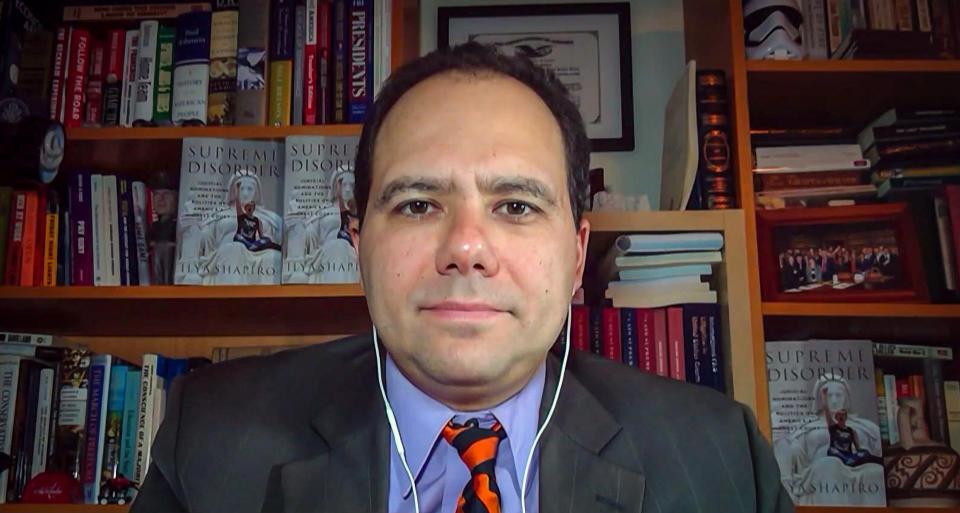Georgetown Law administrator resigns after tweet about 'lesser black woman' on Supreme Court
- Oops!Something went wrong.Please try again later.
A Georgetown University Law School administrator who was placed on leave this year after a tweet about a “lesser black woman” on the Supreme Court has announced his resignation.

Ilya Shapiro, who had been set to take over in February as the executive director of the law school’s Center for the Constitution, wrote an opinion column published Monday in The Wall Street Journal titled “Why I Quit Georgetown.”
After the announcement that Supreme Court Justice Stephen Breyer would retire, Shapiro on Jan. 26 tweeted his choice for the vacancy — Sri Srinivasan, a South Asian of Indian descent who is the chief judge of the U.S. Circuit Court of Appeals for the District of Columbia. Shapiro also criticized President Joe Biden’s vow to nominate a Black woman to the nation’s highest court.
“But alas doesn’t fit into the latest intersectionality hierarchy so we’ll get lesser black woman,” Shapiro wrote in a tweet. “Thank heaven for small favors?”
The tweets were deleted, and Shapiro later tweeted an apology: “I apologize. I meant no offense, but it was an inartful tweet. I have taken it down.”
In the Wall Street Journal column, Shapiro wrote that a four-month investigation into the tweet concluded last week and determined he was cleared on a technicality because he was not an employee when he composed it.
He was reinstated, but he said that “remaining in my job was untenable” and that Georgetown administrators “created a hostile work environment for me.”
Shapiro said a report into the tweet was written by Georgetown's Office of Institutional Diversity, Equity and Affirmative Action, or IDEAA. The report found that if he “were to make another, similar or more serious remark as a Georgetown employee, a hostile environment based on race, gender, and sex likely would be created,” which would open him up to discipline, Shapiro said.
He criticized Georgetown Law Dean William Treanor and said his free speech rights were infringed upon.
“Fundamentally, what Mr. Treanor has done — what he’s allowed IDEAA to do — is repeal the Speech and Expression Policy that he claims to hold dear. The freedom to speak is no freedom at all if it makes an exception for speech someone finds offensive or counter to some nebulous conception of equity.”
Shapiro could not be reached Tuesday for additional comments.
A Georgetown University spokesperson said in a statement that the school "urges members of our community to engage in robust and respectful dialogue."
The statement added: "While we protect speech and expression, we work to promote civil and respectful discourse. In reviewing Mr. Shapiro’s conduct, the University followed the regular processes for members of the Law Center staff."
Treanor, in a letter to the law school community in late January, wrote that Shapiro was placed on leave pending an investigation into whether he violated school policies and expectations about professional conduct.
“I have heard the pain and outrage of so many at Georgetown Law, and particularly from our Black female students, staff, alumni, and faculty. Ilya Shapiro’s tweets are antithetical to the work that we do here every day to build inclusion, belonging, and respect for diversity,” Treanor wrote.
In a statement in January, Shapiro wrote, “I regret my poor choice of words, which undermined my message that nobody should be discriminated against for his or her skin color.
"A person’s dignity and worth simply do not, and should not, depend on race, gender, or any other immutable characteristic," he continued. "While it’s important that a wide variety of perspectives and backgrounds be represented in the judiciary, so blatantly using identity politics in choosing Supreme Court justices is discrediting to a vital institution. Chief Judge Sri Srinivasan is, in my mind, the most qualified nominee a Democratic president could choose.”
In April, Judge Ketanji Brown Jackson became the first Black woman to be elevated to the Supreme Court when the Democratic-controlled Senate confirmed Biden’s pick.
Shapiro’s remarks in a 2009 op-ed about Sonia Sotomayor's nomination to the Supreme Court drew similar controversy. He wrote, “She would not have even been on the short list if she were not Hispanic."

